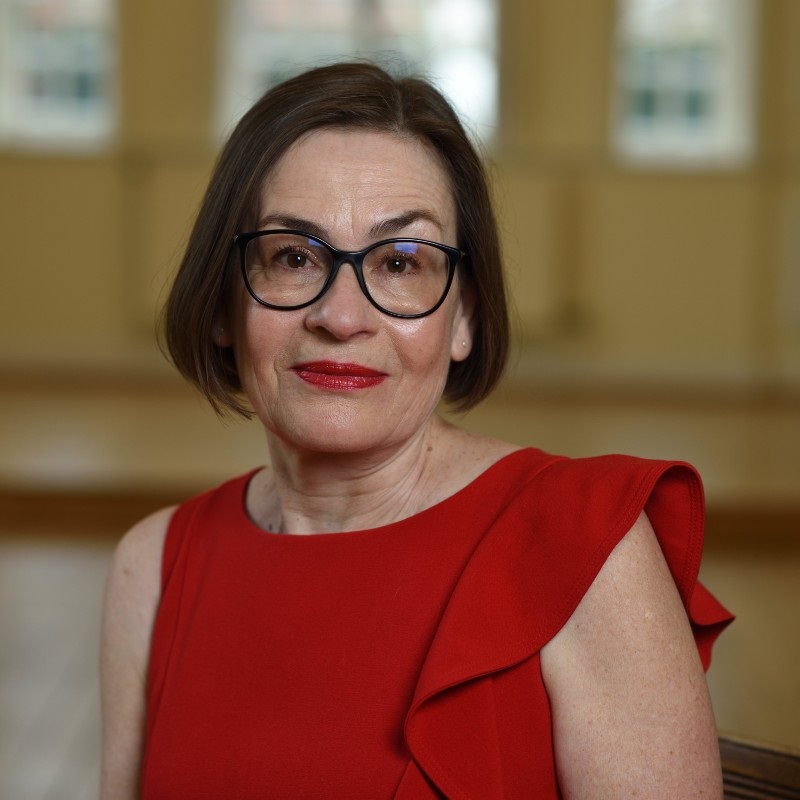Professor Rae Langton
BA (Sydney), PhD (Princeton), FBA, FAAAS, MAE
Fellow (C)

College Roles
- Professorial Fellow (C)
University Roles
- Knightbridge Professor of Philosophy, Faculty of Philosophy
- Chair of the Philosophy Faculty
Contact
Email: rhl27@cam.ac.uk

Biography
Prof Rae Langton is a philosopher, with a particular interest in speech, speech acts and social justice.
I have been Professor of Philosophy at Cambridge, and Fellow of Newnham, since September 2013. I chose to join Newnham because of its people, its commitment to women’s education, and its inspiring history. I’m delighted to be in this latest chapter of a story that includes the heroic figures of Henry Sidgwick, Virginia Woolf, and so many more.
Personal. I was born and raised in India. My Australian parents were lay missionaries in Kashmir, my father a builder by trade, my mother a nurse. I was educated in India (Hebron School, 1966-79), Australia (Sydney, BA Hons. 1986), and the USA (Princeton, PhD 1995). I have taught philosophy in Australia, Scotland, the USA, and England, and have dual Australian and UK nationality. I am married to Richard Holton, also a philosopher, and we have two daughters.
Career highlights. I was Professor of Moral Philosophy at the University of Edinburgh from 1999-2004, a position for which David Hume had once been turned down (fortunately for me he was no longer in the running). I was Professor of Philosophy at MIT from 2004-2013. I was elected to the American Academy of Arts and Sciences in 2013, and to the British Academy in 2014. I was one of five Cambridge faculty among Prospect Magazine’s voted list of 50 ‘World Thinkers 2014’, chosen for ‘engaging most originally and profoundly with the central questions of the world today’. In 2015 I gave the John Locke Lectures in Oxford’s Trinity Term, and for that period was Visiting Fellow at All Souls College. I am The Mind Senior Research Fellow for 2015-16. From this relatively secure vantage point, I can now include the following novel section.
Some career lowlights. My birth certificate doesn’t have my name on it, nor my mother’s, though it helpfully includes my father’s and grandfather’s. (It was issued in Ludhiana, India.) A great future was prophesied for me at the age of sixteen, namely that I would marry a mighty servant of the Lord. My application to study English at Oxford was unsuccessful, though the Fellow liked the sound, intelligent way I wrote. At Sydney, my background in Philosophy was deemed so poor I needed a remedial extra year. At Princeton, my PhD dissertation was initially failed, though (somewhat awkwardly) OUP had meanwhile decided to publish it, as Kantian Humility (see Books).
Books. I am the author of Kantian Humility: Our Ignorance of Things in Themselves (Oxford: Clarendon Press, 1998), and Sexual Solipsism: Philosophical Essays on Pornography and Objectification (Oxford: Oxford University Press, 2009), both available on Oxford Scholarship Online.
My best known articles are ‘Speech Acts and Unspeakable Acts’, ‘Duty and Desolation’, and ‘Defining Intrinsic’ (co-authored with David Lewis).
April 2017: Rae Langton has been elected to be the Knightbridge Professor of Philosophy, with effect from 1 August 2017. The Knightbridge chair was founded in 1683 by John Knightbridge, Fellow of Peterhouse. It has been held by many eminent Cambridge philosophers, including Henry Sidgwick, who founded Newnham College in 1871.
Research Interests
I work in moral and political philosophy, history of philosophy, metaphysics, philosophy of law, speech act theory, and feminist philosophy.
I have a long-standing interest in speech acts and social justice. Speech is not just a matter of making meaningful noises, but of doing things with words. With this in mind, we see that certain forms of speech, including hate speech and some pornography, can subordinate people, altering social norms and authority patterns, and legitimating inequality. Some speech can also silence, by making certain speech acts difficult or impossible—for example, when ‘No’ doesn’t count as a sexual refusal. A speech act approach to language and social life prompts questions at the intersection of philosophy of language, politics and law; and sheds light on the politics of gender and race, hate and violence.
I also work in ethics, metaphysics, epistemology, and the history of philosophy. I have a project about empathy and imagination, and their role in aesthetics and ethics. I maintain a strong interest in Kant, which connects with my independent interest in the metaphysics of intrinsic properties. Drawing on Kant’s early background, and his physics, I argue that ignorance of things in themselves is not idealism, but epistemic humility: we cannot know the world’s intrinsic nature.


